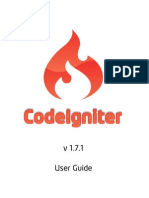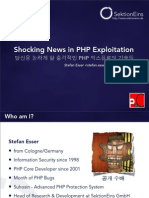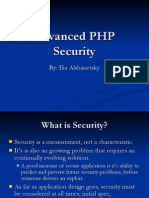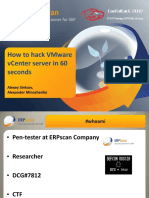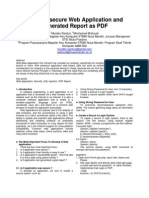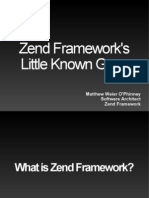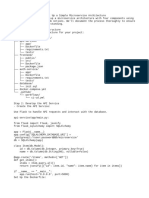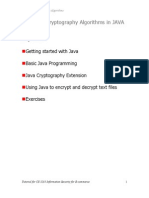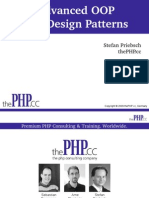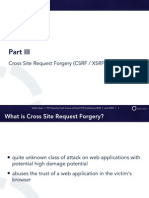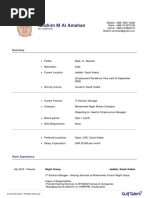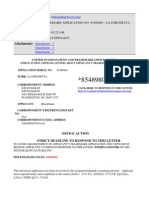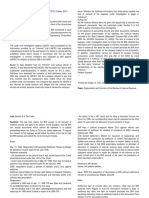Secure Programming With The Zend Framework
Uploaded by
kaplumb_agaSecure Programming With The Zend Framework
Uploaded by
kaplumb_agahttp://www.sektioneins.
de
Secure Programming with the
Zend-Framework
Stefan Esser <stefan.esser@sektioneins.de>
June 2009 - Amsterdam
Who I am?
Stefan Esser
• from Cologne / Germany
• Information-Security since 1998
• PHP Core Developer since 2001
• Month of PHP Bugs and Suhosin
• Head of Research and Development at SektionEins GmbH
Stefan Esser • Secure Programming with the Zend-Framework • June 2009 • 2
Part I
Introduction
Stefan Esser • Secure Programming with the Zend-Framework • June 2009 • 3
Introduction
• Using the Zend-Framework got very popular in the last years
• Growing request of security for Zend-Framework based applications
• Books/Talks/Seminars concentrate on secure programming of PHP
applications without a framework
• Using a framework requires different ways to implement protections
• Some frameworks come with their own security features
Stefan Esser • Secure Programming with the Zend-Framework • June 2009 • 4
Topics
• Authentication
• Input Validation and Input Filtering
• SQL Security
• Cross Site Request Forgery (CSRF) Protection
• Session Management Security
• Cross Site Scripting (XSS) Protection
Stefan Esser • Secure Programming with the Zend-Framework • June 2009 • 5
Part II
Authentication
Stefan Esser • Secure Programming with the Zend-Framework • June 2009 • 6
Classic Applications vs. Zend-Framework
• Zend-Framework applications usually use a
MVC design with dispatcher Dispatcher
• Classic applications usually use neither a
MVC design, nor a dispatcher
• without dispatcher every reachable script Controller
must implement or embed authentication
• classic approach is error-prone
• often scripts exists that forget to
implement the authentication View Model
Stefan Esser • Secure Programming with the Zend-Framework • June 2009 • 7
Central Authentication in Controller
• Deriving the Zend_Controller_Action
• Authentication implemented in init() method
• Attention: if a controller has an own init() method then method
of the parent class must be called
class My_Controller_Action extends Zend_Controller_Action
{
/**
* Init function
*
* First check if this is a logged in user, ...
*/
public function init()
{
$isLoggedIn = true;
try {
My_Auth::isLoggedIn();
} catch (My_Auth_UserNotLoggedInException $e) {
$isLoggedIn = false;
}
...
}
Stefan Esser • Secure Programming with the Zend-Framework • June 2009 • 8
Part III
Input Validation and Input Filtering
Stefan Esser • Secure Programming with the Zend-Framework • June 2009 • 9
Accessing Request Parameters (I)
• Traditionally PHP applications access user input directly
➡ $_GET, $_POST, $_COOKIE, $_REQUEST, $_SERVER, $_ENV, $_FILES
• Form of access also possible in Zend-Framework, but not usual
➡ Input validation and input filtering not directly portable from
traditional PHP applications
Stefan Esser • Secure Programming with the Zend-Framework • June 2009 • 10
Accessing Request Parameters (II)
• Access via request object Zend_Controller_Request_Http
• Either via methods or magic properties
• Access is unfiltered - only raw data
• Access via magic property in the following order
1. internal parameter array
2. $_GET
3. $_POST
$message = $this->getRequest()->message;
4. $_COOKIE
5. $_SERVER
6. $_ENV
Stefan Esser • Secure Programming with the Zend-Framework • June 2009 • 11
Accessing Request Parameters (III)
• function getQuery($key = null, $default = null)
• function getPost($key = null, $default = null)
• function getCookie($key = null, $default = null)
• function getServer($key = null, $default = null)
• function getEnv($key = null, $default = null)
• wrapper around $_GET / $_POST / $_COOKIE / $_SERVER / $_ENV with the
possibility to return a default value
Stefan Esser • Secure Programming with the Zend-Framework • June 2009 • 12
Accessing Request Parameters (IV)
• function getParam($key = null, $default = null)
• gets parameters from the internal parameter array and from $_GET and
$_POST or returns the default value
• parameter sources can be configured ($_GET / $_POST)
• similar to $_REQUEST without $_COOKIE
• function getParams($key = null, $default = null)
• gets all parameters from the internal parameter array, $_GET and $_POST
• in case of double entries, later entries will overwrite the earlier entries
Stefan Esser • Secure Programming with the Zend-Framework • June 2009 • 13
Validation with Zend_Validate
• Validators to validate parameters
• Zend-Framework comes with a set of validators
Alnum, Alpha, Barcode, Between, Ccnum, Date, Digits,
EmailAddress, Float, GreaterThen, Hex, Hostname, Iban,
InArray, Int, Ip, LessThan, NotEmpty, Regex, StringLength
<?php
$email = $this->getRequest()->getPost('email', 'none@example.com');
$validator = new Zend_Validate_EmailAddress();
if ($validator->isValid($email)) {
// email seems valid
} else {
// email seems invalid; Outputting the reasons
foreach ($validator->getMessages() as $message) {
echo "$message\n";
}
}
?>
Stefan Esser • Secure Programming with the Zend-Framework • June 2009 • 14
Chaining Validators
• for complex validations own validators can be implemented
• it is however possible to combine validators in validator chains
<?php
// Creating a Validator Chain
$validatorChain = new Zend_Validate();
$validatorChain->addValidator(new Zend_Validate_StringLength(6, 12))
->addValidator(new Zend_Validate_Alnum());
// Validation of "username"
if ($validatorChain->isValid($username)) {
// "username" is valid
} else {
// "username" is invalid; Outputting the reasons
foreach ($validatorChain->getMessages() as $message) {
echo "$message\n";
}
}
?>
Stefan Esser • Secure Programming with the Zend-Framework • June 2009 • 15
Filtering with Zend_Filter
• Filtering of parameters is done with filters
• Zend-Framework comes with a set of pre defined filters
Alnum, Alpha, BaseName, Callback, Decrypt, Digits, Dir,
Encrypt, Htmlentities, Int, StripNewlines, RealPath,
StringToUpper, StringToLower, StringTrim, StripTags
<?php
$message = $this->getRequest()->getPost('message', '');
$filter = new Zend_Filter_StripTags();
// remove all tags
$message = $filter->filter($message);
?>
Stefan Esser • Secure Programming with the Zend-Framework • June 2009 • 16
Chaining Filters
• for complex filtering own filters can be implemented
• it is however possible to combine filters in filter chains
<?php
// Create a filter chain and add filters
$filterChain = new Zend_Filter();
$filterChain->addFilter(new Zend_Filter_Alpha())
->addFilter(new Zend_Filter_StringToLower());
// Filtering "username"
$username = $filterKette->filter($username);
?>
Stefan Esser • Secure Programming with the Zend-Framework • June 2009 • 17
Inputvalidation/-filtering in Forms (I)
• ZF-Forms use validators and filters automatically
• they are attached to Zend_Form_Element objects
• and can be chained as wished
// create name element
$name = $form->createElement('text', 'name', array('size' => 40, 'maxlength' => 40));
$name->addValidator('Alpha')
->addValidator('StringLength', false, array(1, 40))
->setLabel('Name')
->setRequired(true);
// create message element
$message = $form->createElement('textarea', 'message', array('rows' => 6, 'cols' => 40));
$message->setLabel('Message')
->setRequired(true)
->addFilter('StripTags');
// create submit button
$submit = $form->createElement('submit', 'send');
$submit->setLabel('send');
// add all elements to the form
$form->addElement($name)->addElement($message)->addElement($submit);
Stefan Esser • Secure Programming with the Zend-Framework • June 2009 • 18
Inputvalidation/-filtering in Forms (II)
• Form is validated in the action handler
// checking form data for validity
if (!$form->isValid($this->getRequest()->getPost()))
{
// submit varibales to view
$this->view->form = $form;
$this->view->title = "Form 1";
// stop processing
return $this->render('form');
}
Stefan Esser • Secure Programming with the Zend-Framework • June 2009 • 19
Validation and Filtering with Zend_Filter_Input
• is a framework for validation and filtering complete arrays
• applies defined filter and validation ruleset to supplied data
• allows validation of all user input automatically
$filters = array(
'*' => 'StringTrim',
'month' => 'Digits'
);
$validators = array(
'month' => array(
new Zend_Validate_Int(),
new Zend_Validate_Between(1, 12)
)
);
$params = $this->getRequest()->getParams();
$input = new Zend_Filter_Input($filters, $validators, $params);
if ($input->isValid()) {
echo "OK\n";
}
Stefan Esser • Secure Programming with the Zend-Framework • June 2009 • 20
Part IV
SQL Security
Stefan Esser • Secure Programming with the Zend-Framework • June 2009 • 21
SQL Security - Traditionally
• Traditional PHP Applications
• use PHP‘s database extensions directly
• use their own database abstraction layer
• use PDO
• lots and lots of different escaping functions
• escaping only supports data not identifiers
• partially support for prepared statements
Stefan Esser • Secure Programming with the Zend-Framework • June 2009 • 22
Databaseaccess in Zend-Framewok Applications
➡ Zend-Framework offers different APIs for handling queries
• Zend_Db
• Zend_Db_Statement
• Zend_Db_Select
• Zend_Db_Table
Stefan Esser • Secure Programming with the Zend-Framework • June 2009 • 23
Zend_Db - Queries (I)
• function query($sql, $bind = array())
• uses prepared statement internally
• SQL-Injection still possible if $sql is dynamically created
• function fetchAll($sql, $bind = array(), $fetchMode = null)
• all „fetch“ methods use prepared statements internally
• SQL-Injection still possible if $sql is dynamically created
<?php
$sql = "SELECT id FROM _users WHERE lastname=? AND age=?";
$params = array('Smith', '18');
$res = $db->fetchAll($sql, $params);
?>
Stefan Esser • Secure Programming with the Zend-Framework • June 2009 • 24
Zend_Db - Queries (II)
• function insert($table, array $bind)
• internally uses prepared statements
• SQL-Injection not possible
• function update($table, array $bind, $where = '')
• uses partially prepared statements
• SQL-Injection still possible if $where is dynamically created
• function delete($table, $where = '')
• SQL-Injection still possible if $where is dynamically created
Stefan Esser • Secure Programming with the Zend-Framework • June 2009 • 25
Zend_Db - Escaping
• function quote($value, $type = null)
• applies the correct escaping - one function not many
• ATTENTION: also puts strings in quotes
• function quoteIdentifier($ident, $auto=false)
• applies escaping for identifiers
• a function not available to traditional PHP applications
• ATTENTION: also puts strings in quotes
Stefan Esser • Secure Programming with the Zend-Framework • June 2009 • 26
Zend_Db_Select
• used to dynamically build SELECT statements
• uses partially prepared statements
• SQL-Injectionen still possible when wrongly used
• vulnerable through: WHERE / ORDER BY
// Build this query:
// SELECT product_id, product_name, price
// FROM "products"
// WHERE (price < 100.00 OR price > 500.00)
// AND (product_name = 'Apple')
$minimumPrice = 100;
$maximumPrice = 500;
$prod = 'Apple';
$select = $db->select()
->from('products',
array('product_id', 'product_name', 'price'))
->where("price < $minimumPrice OR price > $maximumPrice")
->where('product_name = ?', $prod);
Stefan Esser • Secure Programming with the Zend-Framework • June 2009 • 27
Part V
Cross Site Request Forgery (CSRF) Protection
Stefan Esser • Secure Programming with the Zend-Framework • June 2009 • 28
Cross Site Request Forgery (CSRF) Protection
• Protections against CSRF attacks are usually based on secret,
session depended form tokens
• Zend-Framework offers Zend_Form_Element_Hash which is a
secret token with built-in validator
• HTML forms can be secured against CSRF attacks by just adding
the form element to the form
$form->addElement('hash', 'csrf_token',
array('salt' => 's3cr3ts4ltG%Ek@on9!'));
Stefan Esser • Secure Programming with the Zend-Framework • June 2009 • 29
Automatic CSRF Protection
• normally protection must be added manually
• by deriving Zend_Form it is possible to create an own form
class that automatically comes with CSRF protection
<?php
class My_Form extends Zend_Form
{
function __construct()
{
parent::__construct();
$this->addElement('hash', 'csrf_token',
array('salt' => get_class($this) . 's3cr3t%Ek@on9!'));
}
}
?>
Stefan Esser • Secure Programming with the Zend-Framework • June 2009 • 30
Token Algorithm
/**
• Token algorithm could be * Generate CSRF token
*
improved */
protected function _generateHash()
• avoid mt_rand() {
$this->_hash = md5(
mt_rand(1,1000000)
• more entropy . $this->getSalt()
. $this->getName()
. mt_rand(1,1000000)
• but it is safe enough );
(for now) $this->setValue($this->_hash);
}
Stefan Esser • Secure Programming with the Zend-Framework • June 2009 • 31
Part VI
Session Management Security
Stefan Esser • Secure Programming with the Zend-Framework • June 2009 • 32
Session Management Configuration
• Configuration has big influence on security
• to safeguard SSL applications set the secure flag
• use an own session id for each application
• harden the session cookie against XSS with the httpOnly flag
• define the maximal lifetime
<?php
Zend_Session::setOptions(array(
/* SSL server */ 'cookie_secure' => true,
/* own name */ 'name' => 'mySSL',
/* own storage */ 'save_path' => '/sessions/mySSL',
/* XSS hardening */ 'cookie_httponly' => true,
/* short lifetime */ 'gc_maxlifetime' => 15 * 60
));
Zend_Session::start();
?>
Stefan Esser • Secure Programming with the Zend-Framework • June 2009 • 33
Session Fixation and Session Hijacking
• Session Fixation
• is harder in case of session validation / strict session handling
• but is only stopped by regenerating the session id after each
change in status
Zend_Session::regenerateId();
• should be added directly into the login functionality
• Session Hijacking
• there is only one real protection - SSL
• httpOnly cookies protect against session id theft by XSS
• session validation only of limited use
Stefan Esser • Secure Programming with the Zend-Framework • June 2009 • 34
Session Validation (I)
• recognizes a valid session by checking certain additional
information stored in the session
• often recommended as protection against session fixation/hijacking
- but doesn‘t make much sense
• Zend-Framework supports session validators to validate sessions
• Zend_Session_Validator_HttpUserAgent
<?php
try {
Zend_Session::start();
} catch (Zend_Session_Exception $e) {
Zend_Session::destroy();
Zend_Session::start();
Zend_Session::regenerateId();
}
Zend_Session::registerValidator(new Zend_Session_Validator_HttpUserAgent());
?>
Stefan Esser • Secure Programming with the Zend-Framework • June 2009 • 35
Session Validation (II)
• Attention checking additional information can cause trouble
• User-agent HTTP header checking is dead since Internet Explorer 8
• Accept HTTP header checks have always been a problem with
Microsoft Internet Explorer
• Checking the client‘s IP address is a problem when big proxy farms
are used (big companies/ISPs)
➡ possible to limit to class C/B/A networks
➡ but useful for SSL applications
Stefan Esser • Secure Programming with the Zend-Framework • June 2009 • 36
Session Validation - Validating Client‘s IP Address
<?php
class Zend_Session_Validator_RemoteAddress extends Zend_Session_Validator_Abstract
{
/**
* Setup() - this method will get the client's remote address and store
* it in the session as 'valid data'
*
* @return void
*/
public function setup()
{
$this->setValidData( (isset($_SERVER['REMOTE_ADDR'])
? $_SERVER['REMOTE_ADDR'] : null) );
}
/**
* Validate() - this method will determine if the client's remote addr
* matches the remote address we stored when we initialized this variable.
*
* @return bool
*/
public function validate()
{
$currentBrowser = (isset($_SERVER['REMOTE_ADDR'])
? $_SERVER['REMOTE_ADDR'] : null);
return $currentBrowser === $this->getValidData();
}
}
?>
Stefan Esser • Secure Programming with the Zend-Framework • June 2009 • 37
Part VII
Cross Site Scripting (XSS) Protection
Stefan Esser • Secure Programming with the Zend-Framework • June 2009 • 38
XSS in Zend-Framework Applications
• Symfony supports automatic output escaping
• Zend-Framework doesn‘t support such automagic
• preventing XSS is job of the programmer
• XSS occurs in the „view“ part
<!DOCTYPE html PUBLIC "-//W3C//DTD HTML 4.01 Transitional//EN"
"http://www.w3.org/TR/html4/loose.dtd">
<html>
<head>
<meta http-equiv="Content-Type" content="text/html; charset=UTF-8">
<title><?php echo $this->title; ?></title>
</head>
<body>
<h2><?php echo $this->headline; ?></h2>
<ul>
<li><a href="<?php echo $this->link; ?>">Link 1</a></li>
</ul>
</body>
</html>
Stefan Esser • Secure Programming with the Zend-Framework • June 2009 • 39
Protecting against XSS (I)
• Two alternative traditional protections
1. Encoding before echoing
<!DOCTYPE html PUBLIC "-//W3C//DTD HTML 4.01 Transitional//EN"
"http://www.w3.org/TR/html4/loose.dtd">
<html>
<head>
<meta http-equiv="Content-Type" content="text/html; charset=UTF-8">
<title><?php echo $this->escape($this->title); ?></title>
</head>
<body>
<h2><?php echo $this->escape($this->headline); ?></h2>
<ul>
<li><a href="<?php echo urlprepare($this->link); ?>">Link 1</a></li>
</ul>
</body>
</html>
Stefan Esser • Secure Programming with the Zend-Framework • June 2009 • 40
Protecting against XSS (II)
• Two alternative traditional protections
2. Encoding when assigning template variables
$entityFilter = new Zend_Filter_HtmlEntities();
$urlFilter = new My_Filter_Url();
$this->view->title = $this->escape("Page 1");
$this->view->headline = $entitiyFilter->filter($this->getRequest()->getPost('link'));
$this->view->link = $urlFilter->filter($this->getRequest()->getPost('link'));
Stefan Esser • Secure Programming with the Zend-Framework • June 2009 • 41
Protecting with Zend_View_Helper
• preventing XSS is error prone - one XSS for every forgotten encoding
• automatically scanning for forgotten escaping is hard
• directly echoing variables should be forbidden (e.g. with Bytekit + pre-commit-hook)
• output only via Zend_View_Helper
• preventing XSS becomes job of Zend_View_Helper
<form action="action.php" method="post">
<p><label>Your Email:
<?php echo $this->formText('email', 'you@example.com', array('size' => 32)) ?>
</label></p>
<p><label>Your Country:
<?php echo $this->formSelect('country', 'us', null, $this->countries) ?>
</label></p>
<p><label>Would you like to opt in?
<?php echo $this->formCheckbox('opt_in', 'yes', null, array('yes', 'no')) ?>
</label></p>
</form>
Stefan Esser • Secure Programming with the Zend-Framework • June 2009 • 42
Automatic Escaping by deriving Zend_View
• all output goes through Zend_View
• deriving Zend_View allows automatic encoding
• e.g. by overloading __set() and __get()
• Attention: Encoding must be context sensitive (e.g.: javascript: Links)
public function __get($key)
{
if (isset($this->_params[$key])) {
return($this->escape($this->_params[$key]));
}
return null;
}
public function __set($key, $val)
{
$this->_params[$key] = $val;
}
Stefan Esser • Secure Programming with the Zend-Framework • June 2009 • 43
Thank you for listening...
Questions ?
http://www.sektioneins.de
Stefan Esser • Secure Programming with the Zend-Framework • June 2009 • 44
You might also like
- 6th Central Pay Commission Salary Calculator100% (436)6th Central Pay Commission Salary Calculator15 pages
- Codeigniter and MVC: Enterprise Class Web Application DevelopmentNo ratings yetCodeigniter and MVC: Enterprise Class Web Application Development18 pages
- PHP Security Crash Course - 6 - PHP Code Inclusion / Evaluation100% (3)PHP Security Crash Course - 6 - PHP Code Inclusion / Evaluation23 pages
- programmingfields.com-Login and Registration Authentication in Codeigniter 4No ratings yetprogrammingfields.com-Login and Registration Authentication in Codeigniter 421 pages
- Server Deployment: Customizing Views 2 How To Write An Authenticationhandler 3 Solving SSL Issues 10No ratings yetServer Deployment: Customizing Views 2 How To Write An Authenticationhandler 3 Solving SSL Issues 1012 pages
- Zend Framework Interview Question AnswersNo ratings yetZend Framework Interview Question Answers10 pages
- KB CertificateManagementandCashDepositAPI 071124 1539No ratings yetKB CertificateManagementandCashDepositAPI 071124 15398 pages
- Custom Encryption Siebel Web Service SecurityNo ratings yetCustom Encryption Siebel Web Service Security12 pages
- Codeigniter Interview Questions and Answers For Freshers and Experienced PDF0% (2)Codeigniter Interview Questions and Answers For Freshers and Experienced PDF11 pages
- mfikri.com-CodeIgniter 4 Login and Register with JWT JSON Web TokenNo ratings yetmfikri.com-CodeIgniter 4 Login and Register with JWT JSON Web Token24 pages
- This Script For Azure To AWS VPN Connectinon of Win2k12 R2No ratings yetThis Script For Azure To AWS VPN Connectinon of Win2k12 R23 pages
- techarise.com-Codeigniter 4 Authentication Login and RegistrationNo ratings yettecharise.com-Codeigniter 4 Authentication Login and Registration19 pages
- Mypbx and Vtiger CRM Integration Configuration Guide: Yeastar Information Technology Co. LTDNo ratings yetMypbx and Vtiger CRM Integration Configuration Guide: Yeastar Information Technology Co. LTD11 pages
- 19-HTTP Session - Laravel - The PHP Framework For Web ArtisansNo ratings yet19-HTTP Session - Laravel - The PHP Framework For Web Artisans7 pages
- What Are The Features of Codeigniter.: 4) Explain What Helpers in Codeigniter Are and How You Can Load A Helper File?No ratings yetWhat Are The Features of Codeigniter.: 4) Explain What Helpers in Codeigniter Are and How You Can Load A Helper File?5 pages
- Arrays, Cookies & Sessions: Computer Science DeptNo ratings yetArrays, Cookies & Sessions: Computer Science Dept30 pages
- Gokhale College of Engineering and Management Nashik - 5: "Project Title"No ratings yetGokhale College of Engineering and Management Nashik - 5: "Project Title"15 pages
- Module 2 - Advanced Web Application Attacks and Remedy PDFNo ratings yetModule 2 - Advanced Web Application Attacks and Remedy PDF44 pages
- AlexanderMinozhenko - AlexeySintsov. How To Hack VMware Vcenter Server in 60 SecondsNo ratings yetAlexanderMinozhenko - AlexeySintsov. How To Hack VMware Vcenter Server in 60 Seconds32 pages
- Zend Framework's Little Known Gems - PHP Quebec 2009100% (1)Zend Framework's Little Known Gems - PHP Quebec 200944 pages
- 10.Web Application Security-SQL InjectionNo ratings yet10.Web Application Security-SQL Injection42 pages
- Read Latest PHP Codeigniter Interview Questions From Below: Explain What Is Codeigniter?No ratings yetRead Latest PHP Codeigniter Interview Questions From Below: Explain What Is Codeigniter?11 pages
- Creating a Student Register Using reactNo ratings yetCreating a Student Register Using react24 pages
- Selenium General Useful Notes From ChatgptNo ratings yetSelenium General Useful Notes From Chatgpt16 pages
- binaryboxtuts.com-How To Make User Login And Registration In CodeIgniter 4No ratings yetbinaryboxtuts.com-How To Make User Login And Registration In CodeIgniter 416 pages
- Mastering Go Network Automation: Automating Networks, Container Orchestration, Kubernetes with Puppet, Vegeta and Apache JMeterFrom EverandMastering Go Network Automation: Automating Networks, Container Orchestration, Kubernetes with Puppet, Vegeta and Apache JMeterNo ratings yet
- Mastering NestJS: Comprehensive Guide to Building Scalable and Robust Node.js ApplicationsFrom EverandMastering NestJS: Comprehensive Guide to Building Scalable and Robust Node.js ApplicationsNo ratings yet
- All The Little Pieces Distributed Systems With PHP100% (2)All The Little Pieces Distributed Systems With PHP85 pages
- Alternative Databases: Scott Macvicar Dutch PHP Conference 2009100% (2)Alternative Databases: Scott Macvicar Dutch PHP Conference 200952 pages
- Habits of Highly Scalable Web Applications100% (3)Habits of Highly Scalable Web Applications32 pages
- PHP Security Crash Course - 5 - Session Management100% (5)PHP Security Crash Course - 5 - Session Management28 pages
- PHP Security Crash Course - 1 - Introduction100% (1)PHP Security Crash Course - 1 - Introduction13 pages
- Scaling Web Sites by Sharding and Replication100% (2)Scaling Web Sites by Sharding and Replication30 pages
- Indoor (Online) Gedung Direktorat Lantai 4: Stage Uk. 3m X 8m, T:20cm New Karpet LED Indoor 3m X 8m + Level. 1mNo ratings yetIndoor (Online) Gedung Direktorat Lantai 4: Stage Uk. 3m X 8m, T:20cm New Karpet LED Indoor 3m X 8m + Level. 1m3 pages
- Philippine Amusement and Gaming Corporation, G.R. No. 151030No ratings yetPhilippine Amusement and Gaming Corporation, G.R. No. 15103019 pages
- Prepared by Nesi Zakuta: Dogus University Industial Enginering Faculty100% (1)Prepared by Nesi Zakuta: Dogus University Industial Enginering Faculty24 pages
- Agri Market Brief 19 Organic Imports - enNo ratings yetAgri Market Brief 19 Organic Imports - en19 pages
- IBM Tivoli Storage Manager For Mail Version 6.3.0No ratings yetIBM Tivoli Storage Manager For Mail Version 6.3.086 pages
- The Business Environment Affects Company Performance. DiscussNo ratings yetThe Business Environment Affects Company Performance. Discuss5 pages
- CIAC Arbitration EO 1008 Ceniza Lecture - 38 PagesNo ratings yetCIAC Arbitration EO 1008 Ceniza Lecture - 38 Pages38 pages
- IGBT MODULE (N Series) : N N Outline DrawingNo ratings yetIGBT MODULE (N Series) : N N Outline Drawing4 pages
- An Assessment On Performance of DC-DC Converters For Renewable Energy ApplicationsNo ratings yetAn Assessment On Performance of DC-DC Converters For Renewable Energy Applications12 pages
- Codeigniter and MVC: Enterprise Class Web Application DevelopmentCodeigniter and MVC: Enterprise Class Web Application Development
- PHP Security Crash Course - 6 - PHP Code Inclusion / EvaluationPHP Security Crash Course - 6 - PHP Code Inclusion / Evaluation
- programmingfields.com-Login and Registration Authentication in Codeigniter 4programmingfields.com-Login and Registration Authentication in Codeigniter 4
- Server Deployment: Customizing Views 2 How To Write An Authenticationhandler 3 Solving SSL Issues 10Server Deployment: Customizing Views 2 How To Write An Authenticationhandler 3 Solving SSL Issues 10
- KB CertificateManagementandCashDepositAPI 071124 1539KB CertificateManagementandCashDepositAPI 071124 1539
- Codeigniter Interview Questions and Answers For Freshers and Experienced PDFCodeigniter Interview Questions and Answers For Freshers and Experienced PDF
- mfikri.com-CodeIgniter 4 Login and Register with JWT JSON Web Tokenmfikri.com-CodeIgniter 4 Login and Register with JWT JSON Web Token
- This Script For Azure To AWS VPN Connectinon of Win2k12 R2This Script For Azure To AWS VPN Connectinon of Win2k12 R2
- techarise.com-Codeigniter 4 Authentication Login and Registrationtecharise.com-Codeigniter 4 Authentication Login and Registration
- Mypbx and Vtiger CRM Integration Configuration Guide: Yeastar Information Technology Co. LTDMypbx and Vtiger CRM Integration Configuration Guide: Yeastar Information Technology Co. LTD
- 19-HTTP Session - Laravel - The PHP Framework For Web Artisans19-HTTP Session - Laravel - The PHP Framework For Web Artisans
- What Are The Features of Codeigniter.: 4) Explain What Helpers in Codeigniter Are and How You Can Load A Helper File?What Are The Features of Codeigniter.: 4) Explain What Helpers in Codeigniter Are and How You Can Load A Helper File?
- Gokhale College of Engineering and Management Nashik - 5: "Project Title"Gokhale College of Engineering and Management Nashik - 5: "Project Title"
- Module 2 - Advanced Web Application Attacks and Remedy PDFModule 2 - Advanced Web Application Attacks and Remedy PDF
- AlexanderMinozhenko - AlexeySintsov. How To Hack VMware Vcenter Server in 60 SecondsAlexanderMinozhenko - AlexeySintsov. How To Hack VMware Vcenter Server in 60 Seconds
- Zend Framework's Little Known Gems - PHP Quebec 2009Zend Framework's Little Known Gems - PHP Quebec 2009
- Read Latest PHP Codeigniter Interview Questions From Below: Explain What Is Codeigniter?Read Latest PHP Codeigniter Interview Questions From Below: Explain What Is Codeigniter?
- binaryboxtuts.com-How To Make User Login And Registration In CodeIgniter 4binaryboxtuts.com-How To Make User Login And Registration In CodeIgniter 4
- Mastering Go Network Automation: Automating Networks, Container Orchestration, Kubernetes with Puppet, Vegeta and Apache JMeterFrom EverandMastering Go Network Automation: Automating Networks, Container Orchestration, Kubernetes with Puppet, Vegeta and Apache JMeter
- Mastering NestJS: Comprehensive Guide to Building Scalable and Robust Node.js ApplicationsFrom EverandMastering NestJS: Comprehensive Guide to Building Scalable and Robust Node.js Applications
- IBM WebSphere Application Server v7.0 SecurityFrom EverandIBM WebSphere Application Server v7.0 Security
- All The Little Pieces Distributed Systems With PHPAll The Little Pieces Distributed Systems With PHP
- Alternative Databases: Scott Macvicar Dutch PHP Conference 2009Alternative Databases: Scott Macvicar Dutch PHP Conference 2009
- PHP Security Crash Course - 5 - Session ManagementPHP Security Crash Course - 5 - Session Management
- Indoor (Online) Gedung Direktorat Lantai 4: Stage Uk. 3m X 8m, T:20cm New Karpet LED Indoor 3m X 8m + Level. 1mIndoor (Online) Gedung Direktorat Lantai 4: Stage Uk. 3m X 8m, T:20cm New Karpet LED Indoor 3m X 8m + Level. 1m
- Philippine Amusement and Gaming Corporation, G.R. No. 151030Philippine Amusement and Gaming Corporation, G.R. No. 151030
- Prepared by Nesi Zakuta: Dogus University Industial Enginering FacultyPrepared by Nesi Zakuta: Dogus University Industial Enginering Faculty
- The Business Environment Affects Company Performance. DiscussThe Business Environment Affects Company Performance. Discuss
- CIAC Arbitration EO 1008 Ceniza Lecture - 38 PagesCIAC Arbitration EO 1008 Ceniza Lecture - 38 Pages
- An Assessment On Performance of DC-DC Converters For Renewable Energy ApplicationsAn Assessment On Performance of DC-DC Converters For Renewable Energy Applications












